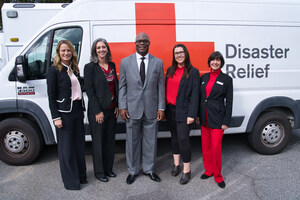Weather Cancels Nearly 125 Red Cross Blood Drives
WASHINGTON, Jan. 6, 2014 /PRNewswire-USNewswire/ -- The American Red Cross is helping people impacted by the frigid cold air covering two-thirds of the country, and offers steps people can take to stay safe during this dangerous weather.
(Logo: http://photos.prnewswire.com/prnh/20090108/RedCrossLOGO)
Red Cross workers are opening shelters and warming centers for people affected by the extreme cold, and working with local emergency officials to respond if needed as the cold weather moves to the east. Officials report as many as 117 million people are living under dangerous wind chill warnings, advisories and watches.
Sunday night 280 people stayed in 19 shelters in Indiana, Illinois, Ohio and Massachusetts because of the weather. The Red Cross has helped people in Indiana, Illinois, Iowa, Wisconsin, Minnesota, Missouri, Nebraska, Kansas, North Dakota, South Dakota, New York, New Jersey, Connecticut, Rhode Island and Massachusetts since the current winter onslaught began last week.
PLEASE GIVE BLOOD The bitterly cold weather has already caused the cancellation of nearly 125 Red Cross blood drives in 17 states, resulting in almost 4,000 uncollected blood and platelet donations. Despite the weather, hospital patients across the country will still need blood. Please consider making an appointment to donate blood or platelets when it is safe to do so in your area.
You can make an appointment to give blood online at redcrossblood.org or by calling 1-800-RED CROSS. To give blood, someone must be at least 17 years of age, meet weight and height requirements and be in general good health. Donors should bring their Red Cross blood donor card or other form of positive ID with them. Some states allow 16-year-olds to give with parental consent.
COLD WEATHER SAFETY TIPS As this latest outbreak of cold air moves across the country, people could experience wind chills as cold as 60 degrees below zero in some areas. To stay safe during this dangerous weather, follow these steps:
- Wear layers of lightweight clothing to stay warm. Gloves and a hat will help prevent losing body heat.
- Someone should seek medical attention immediately if they have symptoms of hypothermia, including confusion, dizziness, exhaustion and severe shivering.
- Watch for symptoms of frostbite, including numbness, flushed gray, white, blue or yellow skin discoloration, numbness, or waxy feeling skin.
- Don't forget family pets – bring them indoors. If they can't come inside, make sure they have enough shelter to keep them warm and that they can get to unfrozen water.
- Avoid frozen pipes - run water, even at a trickle, to help prevent them from freezing. Open the kitchen and bathroom cabinet doors to allow warmer air to circulate around the plumbing. Be sure to move any harmful cleaners and household chemicals out of the reach of children. Keep the garage doors closed if there are water lines in the garage.
- Keep the thermostat at the same temperature day and night to help avoid freezing pipes.
- Download the Red Cross First Aid App for quick, expert advice on what to do in case of an emergency. This free app is available on the Apple iTunes or Google Play stores.
HOME FIRE RISK INCREASES DURING COLD Red Cross workers are also responding to numerous home fires across the country. During extremely cold weather, the risk for a fire in someone's home can increase. To avoid fire danger, you should remember the following:
- Never use a stove or oven to heat the home.
- If using a space heater, place it on a level, hard surface and keep anything flammable at least three feet away – things such as paper, clothing, bedding, curtains or rugs. Turn off space heaters and make sure fireplace embers are out before leaving the room or going to bed.
- If using a fireplace, use a glass or metal fire screen large enough to catch sparks and rolling logs.
- Use generators correctly – never operate a generator inside the home, including in the basement or garage.
- Don't hook a generator up to the home's wiring. The safest thing to do is to connect the equipment someone wants to power directly to the outlets on the generator.
About the American Red Cross:
The American Red Cross shelters, feeds and provides emotional support to victims of disasters; supplies about 40 percent of the nation's blood; teaches skills that save lives; provides international humanitarian aid; and supports military members and their families. The Red Cross is a not-for-profit organization that depends on volunteers and the generosity of the American public to perform its mission. For more information, please visit redcross.org or visit us on Twitter at @RedCross.
SOURCE American Red Cross
WANT YOUR COMPANY'S NEWS FEATURED ON PRNEWSWIRE.COM?
Newsrooms &
Influencers
Digital Media
Outlets
Journalists
Opted In





Share this article